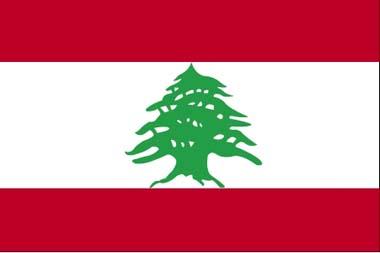Lebanon
2009-08-19 16:42 BJTSpecial Report: Asia Pacific |
Geography and Climate
Lebanon is a small and beautiful country on the Eastern shore of the Mediterranean Sea. It is located at the meeting point of three continents and, as such, has been the crossroads of many civilizations whose traces may still be seen today. Its coastline is about 225 km (150 miles) in length and is, on average, 45 km (30 miles) wide. The total area of the country amounts to 10,452 square km (4,500 square miles). Along the coast are the five famous cities of Beirut, Byblos, Sidon, Tripoli, and Tyre (see interactive map under Tourism). It is bordered in the north and east by Syria and, in the south, by Palestine.
 |
| Lebanon flag |
Lebanon's beauty is illuminated by its geography (see interactive map under Tourism.) -- its narrow coastal plane and two parallel north/south mountains (the mountains of Lebanon and anti-Lebanon). The fertile Bekaa valley, with its Litani and Orontes Rivers, separates these mountains and nourishes the terrain. Residing majestically over the valley, Qournet Assaouda in the north of Mount Lebanon (altitude 3,083 meters or 10,112 feet) and Jabal al-Sheikh in the south of the anti-Lebanon range (altitude 2,814 meters or 9,230 feet) remain the highest peaks in the country.
This unparalleled natural splendor is enhanced by Lebanon's moderate, Mediterranean climate. Lebanon enjoys about 300 days per year of sunshine. The winter is mild on the coast and snowy in the mountains, while the summer is hot on the coast and mild on the mountains. It is possible during the spring months to ski in the mountains and swim on the coast in the same day!
Average Temperatures for Beirut (coastal) and Zahle (inland) in Centigrade (ºC)
Government and Politics
Due to its long history, natural beauty, and rich culture, the Republic of Lebanon has always occupied a special place in the world. Beginning with its independence on November 22, 1943, Lebanon has been and continues to be an integral player in the Middle East and throughout the international community. As an Arab country, Lebanon's official language is Arabic; however, English and French are widely spoken. Tolerance and the encouragement of diversity, as well as its strong political culture have confirmed Lebanon's world prominence. Lebanon is a founding member of the League of Arab States (LAS) and the United Nations, and it has played a major role in the drafting of the Universal Declaration of Human Rights.
Upon its independence, Lebanon adopted this flag, with the cedar as a symbol of its enduring strength.
As a democratic republic, Lebanon enjoys a parliamentary system of government with a President, a Prime Minister, and a cabinet chosen through an electoral process. The structure of the government is based on the constitutional principle of separation between the executive, the legislative, and the judicial branches.
Business
As the region's center of trade and business, Lebanon is a host to several foreign companies. Lebanon offers one of the most liberal investment climates in the Middle East. The government offers incentives to attract foreign and domestic investment, including low income tax rates for individuals and corporations.
With the lift of the US government ban on travel to Lebanon in 1997, US companies are now encouraged to enter the Lebanese market.
For more information on trade, business, economy, or investment in Lebanon, check these links The Ministry of Economy and Trade, The Investment and Development Authority in Lebanon, or The Ministry of Finance.
Education
At the outset of the 19th century, professors, poets, journalists, and historians convened in Lebanese cultural institutions to revive old Arab traditions and extol the value of modern culture. Lebanon’s seven major universities and numerous specialized colleges were thus founded. For example, the American University in Beirut, founded in 1866, offers a liberal education that has trained many of the region's leaders, educators, and scientists. A Lebanese state university was founded in 1967 comprising faculties of law, medicine, arts, and science. Moreover, Lebanon's nation-wide network of elementary and secondary public and private schools lay a strong foundation for further university education and vocational training.

 Mail
Mail Share
Share Print
Print


 Video
Video









 2009 China Central Television. All Rights Reserved
2009 China Central Television. All Rights Reserved